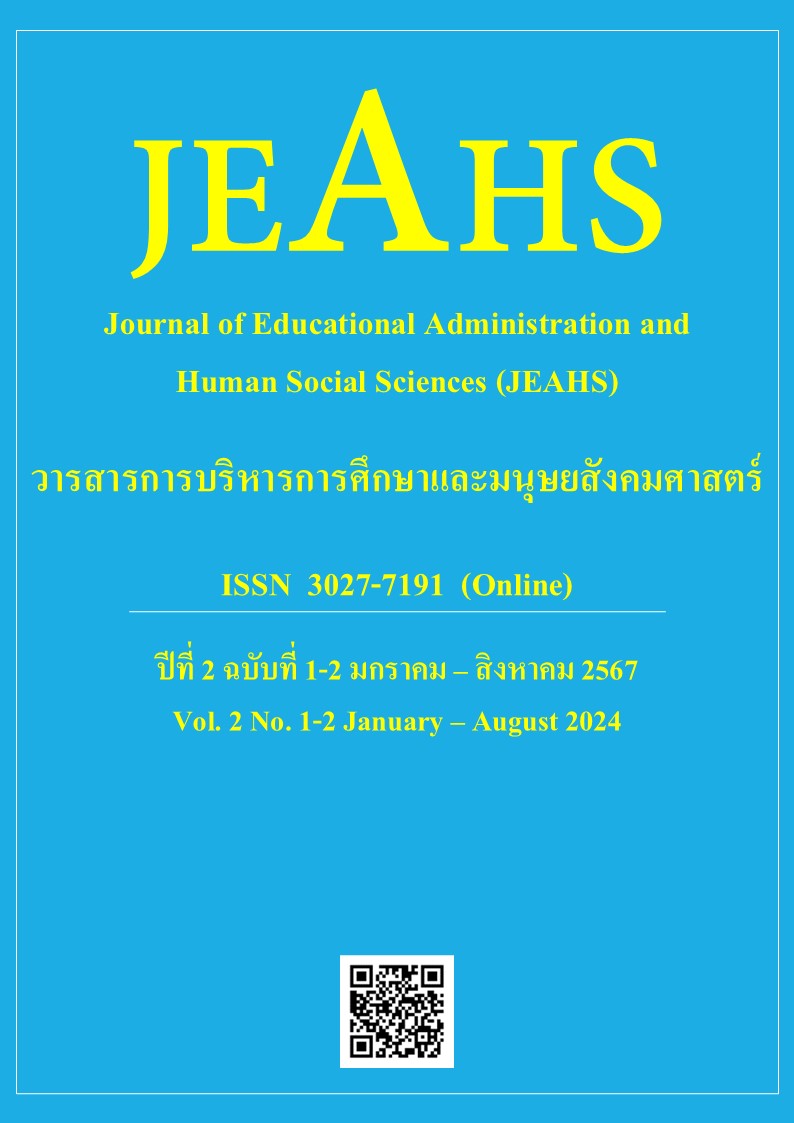SELF-DEVELOPMENT ACCORDING TO THE TRIPLE TRAINING AS DESCRIBED IN THE TRIPITAKA
Main Article Content
Abstract
The Trisikkha principle is the heart of self-development according to Buddhism, consisting of 3 main components: 1) Morality is the training of behavior to be appropriate and beneficial to oneself and others. It emphasizes the observance of the 5 precepts as a foundation and the training of discipline in daily life to create a good foundation for further mental development. 2) Concentration is the training of the mind to be calm, to concentrate on one thing to develop mental qualities such as kindness, compassion, patience and mindfulness. 3) Wisdom is the training of wisdom to gain knowledge and understanding of things correctly, to see the truth of life clearly, to lead to the cessation of suffering and liberation.
Self-development according to the Trisikkha principle in the Tripitaka is the training of oneself in body, speech and mind to be a good person, to be happy and have a clear understanding of life. This allows individuals to develop themselves in body, speech and mind to be happy and peaceful inside and to be able to live in society happily and to be beneficial to the community. The ultimate goal is to achieve liberation from suffering. The benefits gained from practicing the Trisikkha principle are as follows: 1) Peace of mind: concentration helps the mind to be calm and happy; 2) Good relationships: conserving the precepts leads to good relationships with others; 3) Increased wisdom: practicing wisdom helps us to understand life and solve problems better; and 4) Continuous self-development: practicing the Trisikkha is a continuous process and helps us to develop ourselves throughout our lives. In addition, the Trisikkha principle can be applied in daily life in many ways, such as practicing Dhamma, meditating, studying the teachings of the Buddha, doing good deeds, and living peacefully with others.
Article Details

This work is licensed under a Creative Commons Attribution-NonCommercial-NoDerivatives 4.0 International License.
บทความที่ส่งมาขอรับการตีพิมพ์ในวารสารวารสารการบริหารการศึกษาและมนุษยสังคมศาสตร์ จะต้องไม่เคยตีพิมพ์หรืออยู่ระหว่างการพิจารณาจากผู้ทรงคุณวุฒิเพื่อตีพิมพ์ในวารสารอื่น รวมทั้งผู้เขียนจะต้องคำนึงถึงจริยธรรมการวิจัย ไม่ละเมิดหรือคัดลอกผลงานของผู้อื่นมาเป็นของตนเอง ซึ่งทางวารสารได้กำหนดความซ้ำของผลงานด้วยโปรแกรม CopyCat เว็บ Thaijo ในระดับ ไม่เกิน 25%
ในกรณีที่ บทความวิจัยมีกระบวนการวิจัยเกี่ยวข้องกับมนุษย์ ผู้นิพนธ์จะต้องส่งหลักฐานการรับรองจริยธรรมการวิจัยในมนุษย์มาประกอบการลงตีพิมพ์ด้วยจึงจะได้รับการพิจารณาลงตีพิมพ์ในวารสาร
ผู้เขียนบทความจะต้องปฏิบัติตามหลักเกณฑ์การเสนอบทความเพื่อตีพิมพ์ในวารสารการบริหารการศึกษาและมนุษยสังคมศาสตร์ รวมทั้งระบบการอ้างอิงต้องเป็นไปตามหลักเกณฑ์ของวารสารการบริหารการศึกษาและมนุษยสังคมศาสตร์ โดยรวมทั้งทัศนะและความคิดเห็นที่ปรากฏในบทความในวารสารการบริหารการศึกษาและมนุษยสังคมศาสตร์ ถือเป็นความรับผิดชอบของผู้เขียนบทความนั้น และไม่ถือเป็นทัศนะและความรับผิดชอบของกองบรรณาธิการวารสารการบริหารการศึกษาและมนุษยสังคมศาสตร์ และวารสารการบริหารการศึกษาและมนุษยสังคมศาสตร์
References
ชูสกุล อาจมังกร. (2564). ไตรสิกขา : พุทธธรรมพื้นฐานของการจัดการเรียนรู้. วารสารบวรสหการศึกษาและมนุษยสังคมศาสตร์. 2(2). 41-47.
เนตรชนก วิภาตะศิลปิน. (2559). รูปแบบการพัฒนาเยาวชนตามหลักไตรสิกขาในโครงการสามเณรปลูกปัญญาธรรม. ดุษฎีนิพนธ์พุทธศาสตรดุษฎีบัณฑิต. มหาวิทยาลัยมหาจุฬาลงกรณราชวิทยาลัย.
พุทธทาสภิกขุ. (2549). การศึกษาสมบูรณ์แบบ: คือวงกลมที่คุ้มครองโลกถึงที่สุด. กรุงเทพมหานคร: อุษาการพิมพ์.
พระพรหมคุณาภรณ์ (ป. อ. ปยุตฺโต). (2550). หัวใจพระพุทธศาสนา. พุทธจักร. 61(5). 7.
พระครูปลัดสุรวุฒิ สิริวฑฺฒโก (อุกฤษโชค) และศุขภิญญา ศรีคำไทย. (2562). การบริหารตนตามแนวพุทธธรรมเพื่อบริหารองค์การทางการศึกษา. วารสารครุศาสตร์ปริทรรศน์ คณะครุศาสตร์ มหาวิทยาลัยมหาจุฬาลงกรณราชวิทยาลัย. 6(3). 266-277.
พระครูสุนทรสุวรรณการ (ประทีป สุเมโธ). (2559). รูปแบบการพัฒนาพฤติกรรมการครองตนตามหลักปัญญา 3 สำหรับผู้บริหารสถานศึกษาสังกัดสำนักงานเขตพื้นที่การศึกษาประถมศึกษา. ดุษฎีนิพนธ์พุทธศาสตรดุษฎีบัณฑิต. มหาวิทยาลัยมหาจุฬาลงกรณราชวิทยาลัย.
พระศรีคัมภีรญาณ (สมจินต์ สมฺมาปญฺโญ/วันจันทร์). (2559). บูรณาการพุทธธรรมเพื่อเสริมสร้างพลังบริหาร. พิมพ์ครั้งที่ 2. พระนครศรีอยุธยา : มหาวิทยาลัยมหาจุฬาลงกรณราชวิทยาลัย.
สุมน อมรวิวัฒน์. (2542). การพัฒนาการเรียนรู้ตามแนวพุทธศาสตร์ : ทักษะกระบวนการเผชิญสถานการณ์. กรุงเทพมหานคร: สำนักงานคณะกรรมการการศึกษาแห่งชาติ.
พระพรหมคุณาภรณ์ (ป. อ. ปยุตฺโต). (2565). พุทธธรรม ฉบับปรับปรุงและขยายความ. พิมพ์ครั้งที่ 44. กรุงเทพมหานคร: ผลิธัมม์.
พระธรรมปิฎก (ป. อ. ปยุตฺโต). (2537). พุทธวิธีแก้ปัญหาเพื่อศตวรรษที่ 21. กรุงเทพมหานคร: โรงพิมพ์สหธรรมิก.
ดุษฎี สีตลวรางค์. (2532). การศึกษาในสังคมพระพุทธศาสนาตามที่ปรากฏในพระไตรปิฎก. ดุษฎีนิพนธ์การศึกษาดุษฎีบัณฑิต. จุฬาลงกรณ์มหาวิทยาลัย.
พระพุทธโฆสเถระ. (2554). คัมภีร์วิสุทธิมรรค. แปลและเรียบเรียงโดย สมเด็จพระพุฒาจารย์ (อาจ อาสภมหาเถระ). พิมพ์ครั้งที่ 10. กรุงเทพมหานคร: ธนาเพรส.


